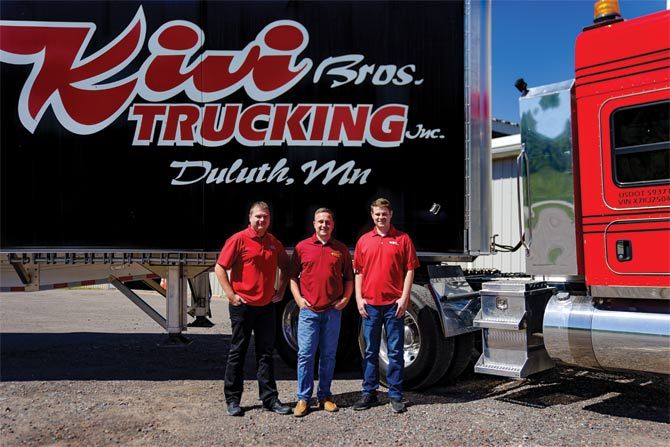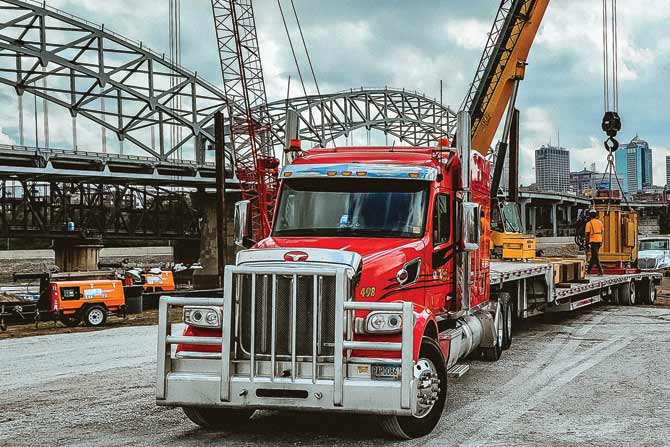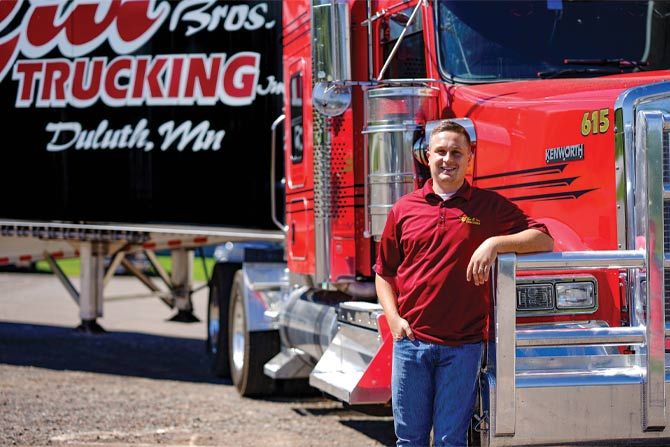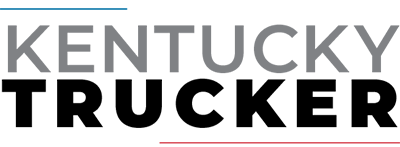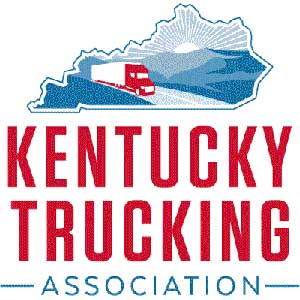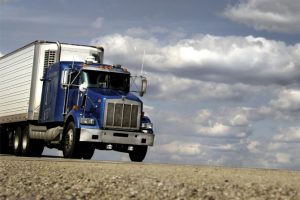
Tyler Kivi is the vice president and chief operating officer at Kivi Brothers Trucking, a third-generation family business with headquarters in Duluth, Minnesota, and terminals in Blaine, Minnesota, and Harrodsburg, Kentucky, as well as a logging yard in Kimball, Wisconsin.
Tyler’s grandfather, Henry Kivi, founded the company with Robert Anderson in 1953 and bought Robert out in 1967. Henry’s sons, Mark, Jeff and Robert, formed Kivi Brothers Trucking in 1995. Jeff’s sons, Derek, Tyler,and Dakota, bought the company in 2017.
KTA recently interviewed Tyler about his life, the family business, why KTA membership is important and his thoughts on the trucking industry.
Please tell us a little about yourself.
I am 32 years old and the entirety of my work experience has been with the company. At 15, I started working summers as a mechanic in the shop. At 16, I received my license, drove myself to work and washed trucks, and at 18, I earned a class A license and drove locally in Minnesota.
When I was 21, I could leave the state and truck across the country to places like Washington, Alaska and Florida. I explored what transportation is about for two or three years and then transitioned into dispatch. It was very hands-on: wrenching, working as a mechanic, washing, driving and working with customers. My brothers and I started leading the company in 2017. Derek became the chief executive officer, and I became the chief operating officer. Dakota manages and runs our Heavy-Haul department, which consists of upwards of 60 specialty trailers.
Mark recently received his last check from the company and is enjoying full retirement, but that doesn’t mean he won’t jump back in the truck once in a while. My dad, Jeff, works in dispatch and is our LTL specialist. He always finds a way to cover the most difficult trucks. Robbie runs our end dump division and still jumps into a truck every day.
What about your family?
My wife Kaitlyn and I moved to Kentucky about five years ago, and it is the perfect place to raise our three children: Austen (5), Jack (2) and Blake (10 months). Kaitlyn is currently working for the company as the director of operations. We still try to take as many trips possible to visit the rest of our family in Michigan and Minnesota.
How did the company get started?
Henry and Robert started Anderson & Kivi Trucking in 1953. In 1967, Robert started a new company called Garith R Anderson Trucking, Inc. My grandfather stuck with what is now Kivi Brothers Trucking.
Please tell us about Henry Kivi.
Unfortunately, I didn’t get to learn as much as I would have liked from Henry as he retired before I was old enough to be around the shop all the time, but he still came to the office every day, sat in a rocking chair and told stories about how he used to truck. He really had a passion for the industry.
Why did you join KTA?
I joined when we first opened our Harrodsburg, Kentucky, location. I was looking for a way to get involved with the local trucking community for networking, friendships, and to find ways to give back to an industry that has given me so much.
Why is association membership important to Kivi Brothers Trucking?
It’s a great networking resource. KTA helps us collaborate with other carriers and is also an educational resource. Every month, the association covers topics to help us keep current on laws, legislation and the industry.
How did the company get into customized transportation services?
Many customers offer standard flatbed freight, as well as some customized. Thankfully, we had a great team behind us who really showed up to ensure one specific customer was given exemplary service. That customer gave us the opportunity to haul some heavy excavators and although we didn’t currently have the proper equipment, we were not about to let this customer down. We purchased the proper trailer and other equipment needed to be successful with this move and that was all it took — one haul and we were hooked.
Please tell us about the open-deck and heavy-haul industry?
There’s a large list of what we can haul on flatbeds. The list includes lumber and other materials such as siding, ceiling tile, excavators, machinery and steel coils. We can move regular commodities and any building products.
The heavy-haul industry is specialized. It involves moving large, heavy loads of 250,000 pounds or more and can mean having police escorts. Some of what Dakota moves is for mining and forestry projects. He also moves bridges.
Please tell us about truckload and less-than-truckload services?
Our primary focus is on moving truckloads. If someone needs to move less than a truckload, we can quote part of the truckload instead of requiring them to purchase a whole trailer. It doesn’t involve mail or parcels.
Less-than-truckload services are a specialty. It takes a lot of planning and specialization with enough freight to ensure it is profitable.
How much work do you do with multi-axle RGNs?
We have a 300-truck fleet. Of those, 50 are multi-axle.
What are your company’s biggest challenges?
We are paying high fuel costs and looking for enough drivers and mechanics.
How do you plan to solve those challenges?
Fuel prices are higher than they have ever been and EVs are coming; however, we haven’t explored EVs yet. Our long-term goal is to be more efficient. For example, we want to burn less fuel and process paperwork more efficiently.
Drivers want to feel involved with something bigger than driving a truck. Our drivers are often away for 2-3 weeks at a time, which can strain families. Our challenge is finding drivers who want to stay in that market.
Hiring and retention are both important. We want to continue to have a family-rooted culture within the company, and we are involved with helping drivers tie into that culture. We have an open-door policy and will talk to anyone in the company.
What are your thoughts about the trucking industry right now?
Everyone is dealing with the same problems: rising costs and shortages of parts and people. Fuel costs are more than double what they were last year. Equipment costs more, too, and everyone wants to find talented and qualified people. We all have to become more efficient.
Many of your long-term employees have worked for the company for over a decade. What’s your secret for employee retention?
I hope everyone who works for us feels like part of the family. In addition, we pay employees a percentage of the revenue, and they make a great living working for us. Some drivers make $80,000-$90,000 per year and more. Drivers make more if they are on the LTL side or do specialty hauling. It can be a lot more; we have some drivers who earn six figures. Since they can make more than the industry standard, their earnings give them a leg up.
Have you had a hard time recruiting drivers?
Hiring has been extremely challenging because the market is challenging. No one wants empty trucks, and every transportation company is looking for drivers. Sometimes other companies can be more competitive than we are.
How can trucking companies solve the driver shortage?
We must engage with potential employees and change their perspectives so they don’t view transportation as a secondary employment option. Changing that perspective has to start at the school level. Getting the younger generation interested in transportation will ensure the industry stays relevant.
Transportation is about more than driving. It involves logistics, too. In addition to drivers, there are also many job opportunities for dock workers, office driver managers, load managers and mechanics.
Our company isn’t currently doing outreach, but several nonprofits are trying to change that. They are on the right track. If classes can be taught about woodworking and small gas engines, schools can also teach classes about transportation logistics.
Have you had a hard time recruiting mechanics?
It’s harder to get mechanics because we are competing against everyone. Engines are engines. As a result, mechanics have versatile skills and lots of opportunities. Competitive diesel shops are partnering with schools to fill the need.
Is there anything the trucking industry should do to encourage young people to become mechanics?
Reach into schools and let students know about the high pay. We need people to start pursuing transportation as their first option instead of a secondary or fallback option.
What would you like readers to remember about Kivi Brothers Trucking when they finish reading this article?
The trucking industry is so important and we really need people to start seeing it that way. We are committed to cultivating an environment for our employees that make them feel cared about and give them a sense of family while they are away from home. We do our best to offer new, top-of-the-line equipment and despite the parts and manpower shortage across the nation, we have a great fleet department who do their best to keep the trucks moving. Our entire team is dedicated to the safe transport of freight and we appreciate the communities who support us in doing that!
